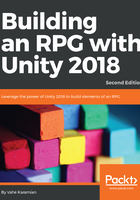
Exploration and quests
The whole idea behind an RPG is the ability of the player to have the freedom to explore the world in which they have been immersed. The more well defined the world is, the more interesting it will be for the player to explore and in return retain their curiosity and engagement throughout the gameplay.
This is achieved by the narrative of the story developed for the RPG. Players will be specifically given the opportunity to walk around the world and explore their surroundings in order to meet their objectives.
In an open-world RPG, the player is free to roam in the world event after they have met their objective, set by the storyline. In such cases, the player can still explore any area which is no longer needed for the continuation of the quest, but they can spend time exploring the area and maybe meet some other non-player characters that they hadn't previously met while completing their mission. But generally speaking, this is not done by the player; once they meet their objective, they are eager to move on to the next quest. Hence, the question is, how much time and effort do the game designers and developers apply to a region after the main objective has been met? The answer would be not much.
Historically, the player follows a linear sequence of quests in order to realize their goals and objectives within the game. To make the game more engaging, the developer can introduce mini-quests within the main plot of the game at that particular location, to give the player the ability to explore and gain more skills and/or abilities. Since these are not part of the main storyline, they can be triggered anytime a player enters a specific area.
For instance, assume the player has completed the main objective of the level and is ready to move on to the next objective. Now, imagine that we have created an open-world environment where the user can revisit the world anytime they choose. If the player decides to go back and explore a certain area of the world they just completed, and they happen to trigger the event to launch this mini-quest, wouldn't that be a great surprise for the player? Keep in mind that these mini-quests should not affect the main storyline, but they can be used to enhance the player experience. These types of decisions are important when you are developing your game. If they choose not to take on the challenge, you should not penalize them, except if you want to be really mean.
Quests may involve defeating one or many enemies, rescuing a non-player character, item-fetch quests, or location puzzles, such as mysteriously locked doors.